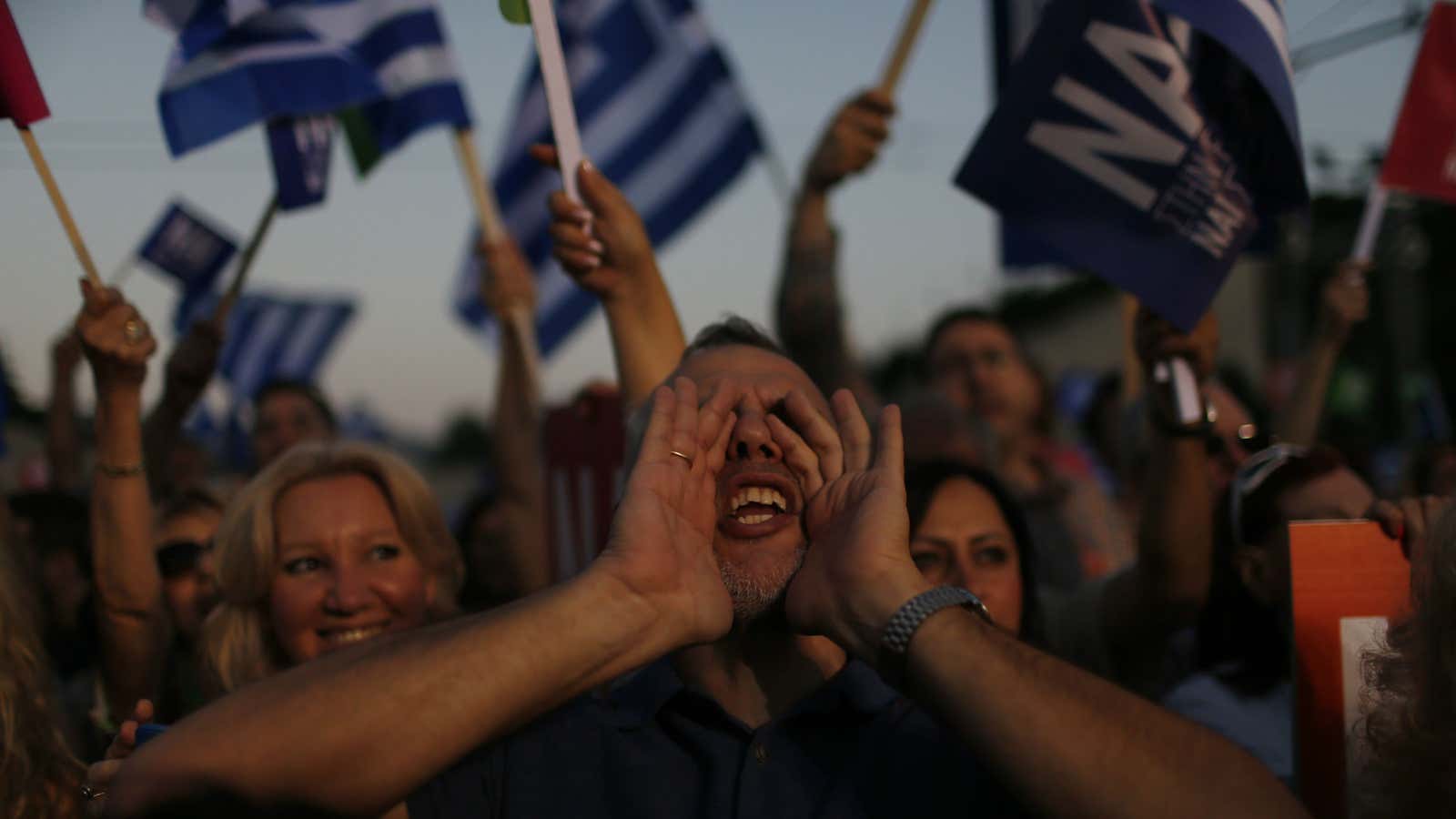Europe might be listening to the wrong Merkel.
German Chancellor Angela Merkel is perhaps the most powerful figure among the constellation of European elites who now face an incredibly difficult series of decisions after Greece rejected the terms of yet another proposed bailout.
But it’s not Angela Merkel, but Wolfgang Merkel, whose thinking really gets to the heart of what’s gone so terribly wrong with the European project.
Wolfgang Merkel, a German academic who studies democracy, published a provocative essay last year titled “Is capitalism compatible with democracy?” In it, he argues, essentially, that the fragile post-World-War II peace between markets and democracy—both of which have grown rapidly—seems to to be fraying. In the aftermath of the global financial collapse of 2008, “the crisis of capitalism threatens to turn into a crisis of democracy.”
That’s what’s happening to Greece. In a debt crisis that has already lasted a half decade, Greece has repeatedly ceded sovereignty in matters of economic-policy-making—very clearly territory of its own democratic institutions—to a group of institutions such as the IMF, the European Commission and the European Central Bank, which all have fairly tenuous links to democratic legitimacy.
Tradeoff between membership in the European club and handing over some government functions to the European bureaucratic superstructure has always been part of the deal. But the difference is that for most of the early decades of its existence, the extension of European Union integration coincided with strong economic growth, allowing policymakers to pitch the European project as a win-win proposition.
In Greece, the prescriptions of European policymakers have been a disaster. A quarter of the Greece economy has vaporized. Unemployment is 25%. It’s the biggest economic disaster for an advanced economy since the Great Depression. (Barring perhaps the collapse of the Soviet Union.) And all of that economic and social pain has done nothing to ease the country’s debt burden. It remains roughly 170% of GDP.
For a country in this situation to be considered a democracy, it has to have the opportunity to vote for another path. That’s what Greece did yesterday casting a resounding “oxi” vote against the austerity provisions of the most recent bailout proposal. But the questions of democratic legitimacy in Europe have cropped up with increasing frequency amid the European debt crisis. Remember when Ireland’s budget was sent to Germany before the Irish parliament in 2011?
But in truth, questions about the democratic legitimacy of the EU were pressing long before the Greek crisis.
They broke into the open in several notable episodes, such as the the defeat of the draft EU constitution in 2005, after the treaty—which would have created a more federalized EU—was soundly defeated in votes in France and the Netherlands, part of the very core of Europe. (The constitution was largely repackaged at the Lisbon Treaty, which was also rejected in its first meeting with voters in Ireland. Ireland eventually approved the treaty, after more or less being directed to vote again and get it right.)
The rejection of the EU constitution essentially was the last gasp of the “permissive consensus,” the period from the late 1950s to the late 1980s, in which the EU was very much a top-down project dominated by political elites. There might have been a reason for that type of structure in the early days of the European Union. After all, the history of populist movements in Europe in the first half of the 20th century is bloody enough.
But as the EU’s power has grown to include dictating domestic economic policy to countries like Greece, Europe’s democratic deficit is getting worse. It’s no wonder that euro-skeptic political parties are proliferating fast, even at the core of the economic bloc in France and the Netherlands. To be sure, European leaders face a tough decision on Greece. But they must find a way to listen to their fellow Europeans when they speak with a democratic voice.
Quartz’s full coverage of Greece’s debt crisis can be found here.
